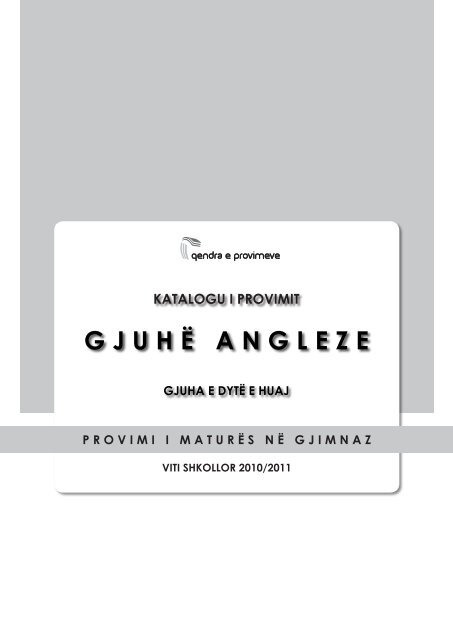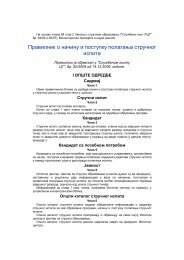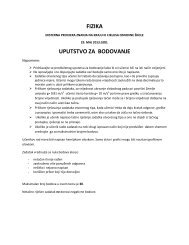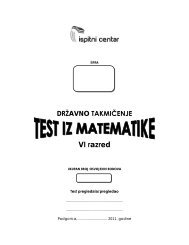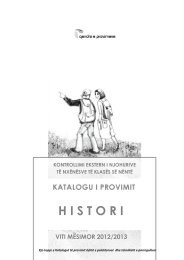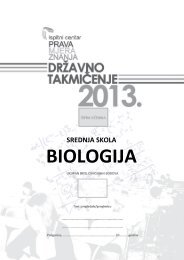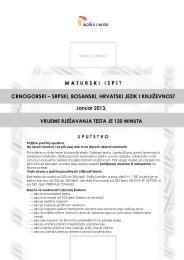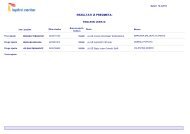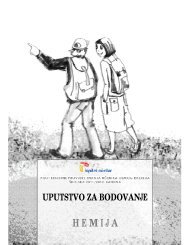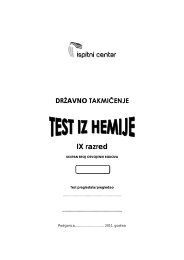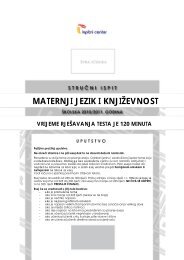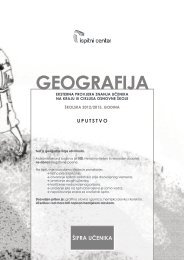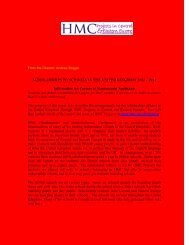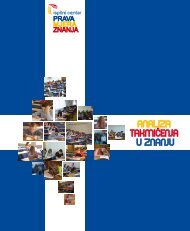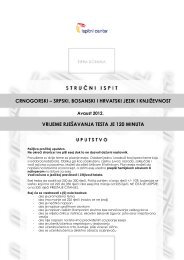Create successful ePaper yourself
Turn your PDF publications into a flip-book with our unique Google optimized e-Paper software.
KATALOGU I PROVIMIT<br />
G J U H Ë A N G L E Z E<br />
GJUHA E DYTË E HUAJ<br />
P R O V I M I I M A T U R Ë S N Ë G J I M N A Z<br />
VITI SHKOLLOR 2010/2011
Katalogun e provimit e përgatitën:<br />
Doc. Dr. Igor Llakiq, Instituti për Gjuhë të Huaja<br />
Fadila Kajeviq, Enti për Shkollim<br />
Jadranka Grboviq, Gjimnazi „Sllobodan Shkeroviq“ - Podgoricë<br />
Snezhana Brajoviq, SHM „Ivan Goran Kovaçiq“ - Herceg Novi<br />
Divna Paleviq Shturm, Qendra e Provimeve<br />
Përktheu: Luigj Berisha
Përmbajtja<br />
1. Hyrje......................................................................................................................................4<br />
2. Qëllimet e përgjithshme të provimit..................................................................................5<br />
3. Struktura e provimit ekstern...............................................................................................6<br />
4. Programi i provimit.............................................................................................................6<br />
4.1. Temat...................................................................................................................6<br />
4.2. Përmbajtjet gjuhësore.......................................................................................7<br />
4.3. Qëllimet e provimit............................................................................................9<br />
5. Shembulli i testit.................................................................................................................10<br />
Rregullat....................................................................................................................10<br />
1. Të dëgjuarit..........................................................................................................11<br />
2. Të lexuarit.............................................................................................................13<br />
3. Gramatika dhe leksiku.......................................................................................17<br />
4. Të shkruarit...........................................................................................................20<br />
6. Zgjidhja e testit dhe mënyra e vlerësimit.......................................................................22<br />
7. Literatura............................................................................................................................26
1. Hyrje<br />
Matura Shtetërore në sistemin arsimor të Malit të Zi futet në vitin shkollor 2010/11 dhe<br />
paraqet kontrollimin ekstern të standardizuar të arritjeve shkollore të nxënësve në fund<br />
të arsimit katërvjeçar në gjimnaz. Në bazë të Ligjit për gjimnazin (“Fleta zyrtare e RMZ”,<br />
nr. 64/02 e 28.11.2002, 49/07 e 10.08.2007 dhe 45/10 e 04.08.2010), Provimi i Maturës<br />
jepet në mënyrë eksterne (neni 38), kurse për përgatitjen e materialeve të provimit dhe<br />
zbatimin e procedurës së Maturës Shtetërore është e ngarkuar Qendra e Provimeve të<br />
Malit të Zi.<br />
Katalogu i provimit hollësisht e përshkruan provimin ekstern nga gjuha angleze si gjuhë e<br />
dytë e huaj. Katalogu i provimit u kushtohet nxënësve dhe mësimdhënësve.<br />
Në katalogun e provimit janë dhënë qëllimet e përgjithshme të provimit, struktura e<br />
provimit dhe përmbajtja e lëndës që i nënshtrohet provimit. Në të ndodhet edhe shembulli<br />
i testit me skemë për vlerësim .
2. Qëllimet e përgjithshme të provimit<br />
Qëllimet e provimit janë të bazuara në kompetencat gjuhësore që janë përkufizuar<br />
me programin e lëndës.<br />
Kompetencat linguistike:<br />
→ njohja e gjuhës së huaj në nivel të fonetikës, morfologjisë, sintaksës,<br />
semantikës, leksikut dhe në nivel të tekstit si dhe aftësimi për komunikim me<br />
shkrim.<br />
Kompetencat sociolinguistike:<br />
→ aftësia e kuptimit të teksteve duke marrë parasysh në qëllimin e tyre dhe<br />
rrethanat jashtëtekstuale në të cilat zhvillohet komunikimi;<br />
→ zotërimi i komunikimit me shkrimi.<br />
Kompetenca e diskursit:<br />
→ njohja e strategjive të cilat nxënësve u mundësojnë që ta realizojnë<br />
komunikimin në formë të shkrimit (organizojnë, bëjnë strukturimin dhe<br />
përshtatjen e porosisë).<br />
Njohja e strategjive, zgjidhja e problemeve në komunikim:<br />
→ njohja e strategjive për zgjidhjen e mosmarrëveshjeve dhe mposhtjes së<br />
pengesave në të kuptuar.<br />
Dijet sociokulturore:<br />
→ njohja e aspekteve të rëndësishme të shoqërisë dhe kulturës së vendeve që<br />
flasin anglisht dhe vetëdijes për ngjashmëritë dhe dallimet në mes të botës ku<br />
jetojnë dhe atë që njohin përmes mësimit të gjuhës angleze.
3. Struktura e provimit ekstern<br />
Provimi me shkrim nga gjuha angleze përbëhet nga katër fusha: të dëgjuarit, të lexuarit,<br />
gramatika e leksiku dhe të shkruarit. Pa marrë parasysh në numrin e pyetjeve, çdo fushë<br />
sjell numër të njëjtë të pikëve nga gjithsej 100 pikë.<br />
Pjesa<br />
Fusha<br />
/koha<br />
Përmbajtja<br />
Tipi i detyrave<br />
Merr pjesë<br />
në test<br />
1<br />
Të<br />
dëgjuarit<br />
15 minuta<br />
2 detyra<br />
dialogu<br />
paraqitja<br />
me zgjedhje të shumëfishtë<br />
me zgjedhje alternative<br />
me përgjigje të shkurtër<br />
25%<br />
2<br />
Të lexuarit<br />
30 minuta<br />
2 detyra<br />
tekstet deri në 800<br />
fjalë (letra, broshura,<br />
artikulli gazetaresk,<br />
reportazhi)<br />
me zgjedhje të shumëfishtë<br />
me zgjedhje alternative<br />
me bashkim<br />
radhitje<br />
me përgjigje të shkurtër<br />
25%<br />
3 Gramatika<br />
e leksiku<br />
30 minuta<br />
3-4 detyra<br />
Gramatika<br />
leksiku<br />
cloze testi i tipit të mbyllur<br />
cloze testi i tipit të hapur<br />
transformimi i fjalive<br />
ndërtimi i fjalëve<br />
25%<br />
4<br />
Të<br />
shkruarit<br />
45 minuta<br />
2 detyra<br />
mesazhi i shkurtër<br />
(40-50 fjalë)<br />
të shkruarit e hartimit<br />
(100-120 fjalë)<br />
mesazhi me e - mail<br />
letra zyrtare dhe jozyrtare,<br />
artikulli, raporti, tregimi,<br />
eseja, hartimi në të cilin<br />
shpreh argumente pro<br />
dhe kundër ndonjë<br />
pikëpamjeje<br />
25%<br />
4. PROGRAMI I PROVIMIT<br />
4.1. TEMAT<br />
1. Familja, shtëpia dhe mjedisi<br />
2. Raportet në familje dhe shoqëri<br />
3. Koha e lirë dhe argëtimi<br />
4. Arsimimi<br />
5. Të ushqyerit<br />
6. Shëndeti<br />
7. Blerja<br />
8. Udhëtimet<br />
9. Veprimtaritë shërbyese<br />
10. Ngjarjet aktuale dhe shoqëria<br />
11. Klima dhe kushtet kohore
4.2. Përmbajtjet gjuhësore<br />
F J A L Ë T<br />
Emri<br />
regular and irregular plural forms, plural only/singular only, foreign plural<br />
countable & uncountable<br />
Genitive: ‘s, ‘ , double genitive, Saxon genitive with measures, time<br />
expressions<br />
Përemri<br />
personal pronouns<br />
demonstrative pronouns (this, these, that, those)<br />
possessive pronouns<br />
relative pronouns (who, whom, that, which, whose)<br />
interrogative pronouns<br />
reflexive/emphatic pronouns<br />
indefinite pronouns (somebody, anything, everybody...)<br />
Nyja<br />
indefinite article a/an, definite article the, zero article<br />
Rrethanori i sasisë<br />
some, any, no, every, much, many, several, few, a few, little, a little<br />
Folja<br />
Verb forms<br />
Present Simple<br />
Present Continuous<br />
Past Simple<br />
Past Continuous<br />
Present Perfect<br />
Present Perfect Continuous<br />
Past Perfect<br />
Future forms<br />
▪ will + V<br />
▪ be going to + V<br />
▪ Present Simple<br />
▪ Present Continuous<br />
▪ Future Continuous R<br />
▪ Future Perfect Simple R<br />
Past Perfect Continuous R<br />
Sequence of Tenses<br />
Question Tags<br />
Imperative<br />
Causative have/get<br />
I wish (present & past time reference), I wish/If only + S + would<br />
used to<br />
be used to<br />
Modal auxiliaries and modal auxiliaries equivalents<br />
(can, could, must, will, would, need, shall, should may, might,<br />
have to, be able to, be allowed to)<br />
modals + perfect infinitive<br />
Passive Voice<br />
▪ Passive Voice (all tenses)<br />
▪ Passive Voice with O d<br />
and O i<br />
▪ passive infinitive: to be V -ed/en<br />
▪ passive gerund: being V -ed/en<br />
▪ It + passive + that clause (it is believed that…)<br />
Multi-part verbs<br />
Gerund or Infinitive
Verbs followed by V -ing<br />
and infinitives<br />
verbs of reporting + Gerund /Infinitive;<br />
verbs of perception + V /V -ing<br />
,<br />
phrases + gerund<br />
verbs expressing likes & dislikes + V / V ing<br />
Infinitive (with /without to)<br />
perfect infinitive (with /without to)<br />
Lidhëza<br />
Coordinating: and, but, as well as, or, either ...or, neither... nor<br />
Subordinating: that, after, before, since, until, when, while, because, as, where,<br />
if, unless, what<br />
Numërori<br />
cardinal numbers<br />
ordinal numbers<br />
Mbiemri<br />
Possessive adjectives: my, your, his, her, its, our, their<br />
demonstrative adjectives (this, these, that, those)<br />
regular and irregular comparison of adjectives (comparative, superlative)<br />
comparison of equality (as+adj+as) & inequality (not so+adj+as)<br />
comparison of adjectives (superiority; inferiority)<br />
participles: present participle V -ing<br />
, past participle V -ed/en<br />
adjective word order<br />
Ndajfolja<br />
manner (fast), place (here), time (now), degree (very), frequency (often)<br />
Comparison of adverbs<br />
adverbs with two forms<br />
word order<br />
Parafjala<br />
position, direction, time<br />
K R I J I M I I F J A L Ë V E<br />
derivation<br />
compound nouns (newespaper, waiting- room, pocket money), adjectives<br />
S I N T A K S A<br />
Affirmative sentences<br />
Negative sentences<br />
Questions: Yes/No questions, wh-questions<br />
Tag Questions<br />
Imperative<br />
Nominal clauses (that),<br />
Relative clauses (defining, non-defining - who, whom, which, that, whose)<br />
Adverbial clauses (denoting time, place and conditional clauses – types<br />
0, 1, 2,( 3R))<br />
Clauses of Purpose (in order to, so that),<br />
reason: as, because, since, Comparison (the…the…),<br />
Reported Speech (statements, questions, commands)<br />
Linking devices (however, generally, in addition)<br />
R<br />
Receptivno
4.3. QËLLIMET E PROVIMIT<br />
Qëllimet e provimit janë përkufizuar në bazë të mënyrës së detyrueshme të kontrollimit<br />
të dijes dhe standardeve arsimore, kurse përfshijnë shkathtësitë e të dëgjuarit, të<br />
lexuarit dhe të shkruarit si dhe gramatikën e leksikun.<br />
TË DËGJUARIT<br />
Duke dëgjuar llojet e ndryshme të teksteve të të folurit autentik siç janë udhëzimet,<br />
lajmet, lajmërimet, shpalljet, raportet, komentimet, fjalimet, tregimet, bisedat<br />
joformale, intervistat, diskutimet nxënësi/ja është në gjendje:<br />
t’i kuptojë idetë kryesore të tekstit që dëgjon,<br />
t’i kuptojë disa informata, eksplicite ose implicite,<br />
t’i vërejë qëndrimet, idetë, mendimet dhe emocionet,<br />
ta dallojë regjistrin.<br />
TË LEXUARIT<br />
Duke lexuar llojet e ndryshme të teksteve (letrat, broshurat, artikujt gazetaresk,<br />
reportazhet, tekstet letrare) nxënësi/ja është në gjendje:<br />
ta njohë llojin dhe dedikimin e tekstit,<br />
ta kuptojë esencën e tekstit si tërësi, si dhe lidhjet në mes të pjesëve të tij,<br />
ta gjejë informatën eksplicite të dhënë në tekst,<br />
ta kuptojë informatën implicite në tekst, respektivisht t’i njohë qëndrimet dhe<br />
emocionet të cilat nuk janë dhënë në mënyrë eksplicite,<br />
ta nxjerr përfundimin për domethënien e fjalës së panjohur nga konteksti.<br />
TË SHKRUARIT<br />
Nxënësi/ja është në gjendje:<br />
që në interaksionin e shkruar të shkruaj e-mailin, mesazhin, letrën zyrtare dhe<br />
letrën jozyrtare,<br />
që në produktin e shkruar të shkruaj rezymenë, artikullin, raportin, përshkrimin e<br />
njerëzve, vendeve, ngjarjeve dhe situatave, tregimin, hartimin në të cilin paraqet<br />
argumentet pro ose kundër ndonjë pikëpamjeje.<br />
Gjatë kësaj pune nxënësi/ja<br />
shfrytëzon leksikun përkatës dhe gramatikën me shenja të pikësimit dhe drejtshkrim<br />
korrekt,<br />
bën strukturimin logjik të tekstit duke bashkuar qartë idetë me mjetet gjuhësore<br />
përkatëse,<br />
shfrytëzon regjistrin përkatës.<br />
GRAMATIKA DHE LEKSIKU<br />
Duke shfrytëzuar saktë shenjat e pikësimit dhe drejtshkrimin, nxënësi/ja është në<br />
gjendje:<br />
t’i përdor strukturat gjuhësore gjegjëse në nivel të formave të fjalës, frazave,<br />
klauzave dhe fjalive,<br />
t’i përdor fjalët gjegjëse, frazat, idiomat dhe kolokimet.
5. SHEMBULLI I TESTIT<br />
Rregullat<br />
Provimi nga gjuha e huaj do të mbahet në kushte të njëjta dhe në mënyrë të njëjtë për<br />
të gjithë nxënësit e klasës së katërt të gjimnazit.<br />
Materiali i provimit do të paketohet në zarfe të veçanta dhe të sigurta, të cilat do të<br />
hapen para nxënësve menjëherë para fillimit të provimit.<br />
Në provim nuk lejohet<br />
prezantimi i rrejshëm<br />
hapja e detyrave të provimit para kohës së lejuar<br />
pengimi i nxënësve tjerë<br />
përshkrimi nga nxënësi tjetër<br />
shfrytëzimi i mjeteve të palejuara dhe telefonit celular<br />
shfrytëzimi i fjalorit<br />
dëmtimi i shifrës në librezën e testit<br />
mosrespektimi i shenjës për përfundimin e provimit<br />
Mjetet e lejuara: lapsi i thjeshtë dhe lapsi kimik/stilolapsi.<br />
Punimi i nxënësit duhet të jetë i shkruar me laps kimik ose stilolaps.<br />
Pas provimit, testet do të paketohen dhe do të kthehen në Qendrën e Provimeve, ku do<br />
të organizohet vlerësimi i tyre.<br />
10
1. TË DËGJUARIT<br />
1.1. For questions 1- 5, choose the correct answer (A, B or C).<br />
1. Listen to Kate talking about physical exercises.<br />
What kind of advice is she offering?<br />
A. How to lose weight.<br />
B. How to travel faster.<br />
C. To join a local gym.<br />
2. Listen to an interview with an actress.<br />
What is the actress doing?<br />
A. expressing regret<br />
B. making a comparison<br />
C. offering advice<br />
3. Listen to Matthew describing someone.<br />
Whom is Matthew describing?<br />
A. his girlfriend<br />
B. his mother<br />
C. his sister<br />
4. Listen to a young man talking to his brother.<br />
What is the young man doing?<br />
A. expressing an opinion<br />
B. giving advice<br />
C. making suggestions<br />
5. Listen to a man talking to someone.<br />
What is the relationship between the man and the person he is talking to?<br />
A. employer and employee<br />
B. father and daughter<br />
C. husband and wife<br />
11
1.2. You will hear a mother talking about her daughter’s computer skills. For questions<br />
1-6, choose the correct answer (A, B or C).<br />
1. Jennifer had problems with<br />
A. a computer game.<br />
B. her daughter.<br />
C. penguins.<br />
2. Sarah is in grade<br />
A. four.<br />
B. five.<br />
C. six.<br />
3. What did Sarah’s mother realise about Sarah?<br />
A. Sarah liked Mozart a lot.<br />
B. Sarah was a good dancer.<br />
C. Sarah was the best person to help.<br />
4. Which of the following is true about computer support specialists?<br />
A. They are strong people.<br />
B. They sell computers.<br />
C. They solve problems.<br />
5. What is an average annual salary of a computer specialist?<br />
A. $ 14,350<br />
B. $ 44,315<br />
C. $ 44,350<br />
<br />
KËSHILLA<br />
Çdo tekst do ta dëgjoni dy herë.<br />
Para dëgjimit të parë do të keni kohë të mjaftueshme që t’i lexoni<br />
pyetjet. Gjatë kohës së dëgjimit të parë përgjigjuni në pyetje më të<br />
lehta.<br />
Te dëgjimi i dytë përgjigjuni në pyetjet e mbetura.<br />
Pas dëgjimit do të keni kohë të mjaftueshme që t’i përshkruani<br />
përgjigjet tuaja në fletën për përgjigje.<br />
12
2. TË LEXUARIT<br />
2.1 Read the text and for questions 1-8, choose the correct answer (A, B or C).<br />
Foods Tastes<br />
Better With<br />
McDonald’s<br />
Logo, Kids Say<br />
1. Hamburgers, French fries, chicken nuggets, and even milk and carrots all taste better<br />
to kids if they think they came from McDonald’s, a study by Dr. Thomas Robinson, a<br />
professor of pediatrics and of medicine at Stanford University, suggests.<br />
2. His team had 63 children, ages 3 and 5, sample five foods: chicken nuggets, a hamburger,<br />
french fries, baby carrots and milk. The chicken nuggets, hamburger and french fries<br />
were all from McDonald’s; the carrots and milk were from a grocery store. Each sample<br />
was divided into two portions: one wrapped in a McDonald’s wrapper or placed in a<br />
McDonald’s bag and the other in a wrapper without the McDonald’s logo.<br />
3. After taste-testing, 77 percent said the labelled fries tasted better, fifty-four percent preferred<br />
McDonald’s-wrapped carrots. “Kids don’t just ask for food from McDonald’s,” Robinson<br />
said. “They actually believe that the chicken nugget they think is from McDonald’s tastes<br />
better than an identical, unbranded nugget.”<br />
4. “This study demonstrates simply and elegantly that advertising literally brainwashes<br />
young children,” said Dr. David Katz, the director of the Prevention Research Center at<br />
Yale University School of Medicine. “Kids, it seems, literally do judge a food by its cover.<br />
And they prefer the cover they know,” said Katz.<br />
5. Further research revealed that one-third of the children ate at McDonald’s more than once<br />
a week, and more than three-quarters had McDonald’s toys at home. In addition, the<br />
children in the study had an average of 2.4 televisions in their homes. More than half the<br />
kids had a TV in their bedrooms. “We found that kids with more TVs in their homes and<br />
those who eat at McDonald’s more frequently were even more likely to prefer the food in<br />
the McDonald’s wrapper,” Robinson said.<br />
6. A McDonald’s spokesperson said that this is an important study and the company has<br />
been working on providing healthy food choices. “McDonald’s own ‘branding’ of milk,<br />
apples, salads, and other fruits and vegetables has directly resulted in major increases in<br />
the purchases of these menu items by moms, families and children,” he said. “The fact is,<br />
parents make the decisions for their children.”<br />
7. Last December, McDonald’s and nine other food companies agreed to devote at least half<br />
their advertising to promoting healthier choices for children. But many experts remain<br />
unimpressed. “The best response the fast-food industry could make,” Robinson said, “is<br />
to change their menus to include a majority of healthful foods instead of encouraging<br />
consumption of high-fat, high-calorie foods.”<br />
13
8. It is estimated that McDonald’s spends more than $1 billion dollars per year on U.S.<br />
advertising. “It’s really an unfair playing field out there for young children. It’s very clear<br />
they cannot understand the persuasive nature of advertising.”<br />
9. Children in the United Sates are already subject to epidemic obesity and rising rates of onset<br />
diabetes. If current trends persist, even greater threats, such as heart disease in adolescence,<br />
could become common. “The branding of junk foods into the minds of young children should<br />
be eliminated. When product familiarity is breeding ill health, it is time to put a stop to it,”<br />
Katz said.<br />
http://health.usnews.com<br />
1. In this study, what were the children asked to do?<br />
A. To decide which food had a better taste.<br />
B. To decide which wrapping paper looked nicer.<br />
C. To guess which food came from McDonald’s.<br />
2. Why did the children prefer the food in the McDonald’s wrapper?<br />
A. Its taste was different from the food in unmarked wrappers.<br />
B. The cover was colourful.<br />
C. They believe that anything made by McDonald’s tastes better.<br />
3. How many types of food did the kids taste-test?<br />
A. Three.<br />
B. Four.<br />
C. Five.<br />
4. Which McDonald’s item was preferred by the largest percentage of children?<br />
A. branded carrots<br />
B. branded french fries<br />
C. branded hamburgers<br />
5. Children’s preference for McDonald’s wrapper depends on (Paragraph 5)<br />
A. what they ate at McDonald’s.<br />
B. the number of McDonald’s toys they had at home.<br />
C. the number of TV sets in their homes.<br />
6. Paragraph 6 implies that the purchases of fruit and vegetables were increased thanks<br />
to<br />
A. McDonald’s brand on these products.<br />
B. McDonald’s spokesperson.<br />
C. moms, families and children.<br />
7. What is Dr Robinson’s advice to the fast-food industry?<br />
A. Change menus and include more high-fat foods.<br />
B. Encourage high-calorie food consumption.<br />
C. Promote healthier food choices.<br />
8. Which of the following is true of paragraph 8?<br />
A. Advertisers are playing a fair game with young children.<br />
B. McDonald’s does not invest enough money in advertising fast-food products for<br />
children.<br />
C. Young children are unaware of the intention of advertising.<br />
14
2.2 Read the text and choose from the titles A-I the one which fits each gap (1-8).<br />
There is one extra title which you do not need to use.<br />
Join us<br />
in the next<br />
IAYC!!!<br />
1. ................................................<br />
The International Astronomical Youth Camp (IAYC) 2009 will take place in southern Poland,<br />
near the small town of Korbielow in the Beskid Zywiecki district which is part of the outer<br />
Eastern Carpathians.<br />
2. ................................................<br />
The IAYCs are organised by an international team of students and young scientists. They<br />
are all volunteers who started as participants in the IAYC and were then asked to join IWA,<br />
the association that has been organising these camps for almost forty years now. It must be<br />
stressed that we do not have any commercial interest in organising the IAYCs. However, IWA<br />
IAYC has a great deal of experience in organising these camps.<br />
3. ................................................<br />
You also must be able to communicate in English. As we all come from different countries,<br />
English is the common camp language. Therefore, you have to speak English not only during<br />
the activities in the working groups and the non-astronomical programme, but throughout<br />
the entire camp. The aim of this is also to discourage people from the same country or<br />
language group to spend all their time together. IAYC offers you a great opportunity to make<br />
friends from other countries and it would be a pity to waste that opportunity. You should not<br />
worry though, as your English does not need to be perfect. But you should be able to have a<br />
normal conversation without a dictionary.<br />
4. ................................................<br />
The IAYC day starts with breakfast at 12:00 (noon). After breakfast, the first working group<br />
session takes place. The working group sessions last about two hours, and after that there is<br />
some free time. You can participate in one of the sports competitions, learn how to develop<br />
photos, build and launch micro-rockets, take a walk with your friends... you choose. After<br />
dinner, it’s NAP time (NAP stands for Non-Astronomical Programme), then a 2-hour evening<br />
session. Around midnight we have a light meal and if the sky is clear we observe. Three days<br />
are reserved for a special NAP programme, an excursion and a free day. At ten o’clock in<br />
the evening, the second daily working group session takes place. A light meal at midnight<br />
ends this evening working group session. If the sky is clear, you will have the opportunity to<br />
observe afterwards.<br />
5. ................................................<br />
Most of the astronomical activities in the camp take place in working groups. There are eight<br />
working groups; each one has about 8 participants and one leader who is responsible for the<br />
group. Every member of the group works on his or her project, either alone or in groups of<br />
2 or 3. At the end of the camp, everybody will write a small report on the project and all<br />
15
these reports are then gathered in a book which will be sent to you after the camp. This makes<br />
a nice souvenir and a good way to know what everybody worked on during the camp.<br />
6. ................................................<br />
Doing astronomy for three weeks without anything else drives you nuts. That’s why every day<br />
after dinner, there is an anything-but-astronomy activity with the entire group: group games,<br />
singing evenings, discussions and many more things.<br />
7. ................................................<br />
If you want to know more about the IAYC, or if you want to participate in next year’s camp,<br />
then email us at info@iayc.org. People having serious problems paying this participation fee<br />
can apply for a grant. If our financial support is necessary for you to attend the camp, then<br />
contact Ana on the address below or write an email to info@iayc.org in order to obtain the<br />
application form for our limited grant programme.<br />
Adapted from www.iac.org<br />
A. About IAYC<br />
B. A lot of good telescopes<br />
C. Contacting the IAYC<br />
D. IWA: the organisation behind the IAYCs<br />
E. Life in an IAYC camp<br />
F. Non-astronomical programme<br />
G. Participants in the IAYCs<br />
H. Working groups<br />
16
3. GRAMATIKA DHE LEKSIKU<br />
3.1 Read the text and choose the correct answer (A, B, C or D) to fill in the gap.<br />
MONTENEGRO – WILD BEAUTY OF THE MEDITERRANEAN<br />
I’m planning a (1) .......................................................... to Montenegro by car at the beginning<br />
of September. We think to enter Montenegro and (2) ......................................... one night<br />
in Kotor, three or four in Budva (using it as a base to (3) ......................................... the<br />
surroundings and to enjoy the beaches), (4) ...................................................... go inland to<br />
spend a (5) ................................................. of days in Žabljak.<br />
I’m wondering:<br />
Which is the better way from Budva to Žabljak? Via Nikšić (visiting Ostrog Monastery)<br />
or via the Morača valley (visiting Morača Monastery and (6) ............................ Tara river)?<br />
Do you have (7) ...................................... advice, suggestions to my planned itinerary?<br />
1. A excursion B journey C vacation D voyage<br />
2. A pass B reach C remain D spend<br />
3. A attend B go C visit D walk<br />
4. A after B before C than D then<br />
5. A couple B few C pair D some<br />
6. A a B an C -- D the<br />
7. A all B any C each D other<br />
17
3.2. Read about Marko, a Montenegrin boy who is attending Mountain Summer Camp<br />
in America, and write the correct forms of the verbs in brackets:<br />
“This is my first visit to America and it’s awesome, really! There (1) ........................... (be)<br />
about 60 children here and every day is rich with various activities and competitions.<br />
Last week, for example, we (2) ...................................................... (have) a skiing competition.<br />
I wasn’t very successful but who cares, it was fun! They also organize a lot of exciting<br />
trips.<br />
We (3) ................................................................................. (visit) two national parks so far, but I can’t<br />
wait (4) ...................................................... (see) the Colorado Canyon which is scheduled for next<br />
week.<br />
I will never forget my first evening here. All the children (5) ...................................................... (sit)<br />
around the campfire and it was all so exciting because I (6)................................................................<br />
(not see) a real campfire before. A great, great experience!<br />
I really enjoy (7) ...................................................... (learn) a lot of new stuff here. At the moment,<br />
I (8) ...................................................... (prepare) a report on extreme sports in Montenegro. Hope<br />
everything goes well with my presentation. When I return home, I (9).........................................<br />
...... (try) to save some money so that I can attend this camp again. Actually, I promised<br />
Jack, my best mate here, that I (10)................................................................................. (come) back<br />
next year.”<br />
18
3.3 Transform the following sentences using the given word(s) so that they have a<br />
similar meaning. You can use no more than five words including the given word.<br />
1. It’s possible that he is busy now.<br />
MIGHT<br />
He ....................................................................................................................................... busy now.<br />
2. Africa doesn’t have enough water, so they can’t grow a lot of crops there.<br />
MORE<br />
If Africa ......................................................................................................................................., they<br />
would be able to grow a lot of crops there.<br />
3. At the moment, he is collecting old books for school libraries.<br />
COLLECTED<br />
At the moment, old books ............................................................................................................ for<br />
school libraries.<br />
4. “Did you really buy this beautiful sweater for me, Bill?”<br />
BOUGHT<br />
She wondered .......................................................................................................................................<br />
that beautiful sweater for her.<br />
5. We haven’t arranged to do anything in particular this weekend.<br />
ARE<br />
We ............................................................................................................ anything in particular this<br />
weekend.<br />
19
4. TË SHKRUARIT<br />
4.1 You want to go to a concert ∕ a sports event. Tell your friend about it and ask him ∕<br />
her by e-mail to join you.<br />
Fill in the field: Subject.<br />
In the writing area:<br />
• include when and where the concert ∕ sports event will take place<br />
• invite your friend and say why you should go to that event<br />
Write 40-50 words.<br />
From: Inva / Iliri<br />
To:<br />
Subject:<br />
............................................................................................................................................<br />
............................................................................................................................................<br />
............................................................................................................................................<br />
............................................................................................................................................<br />
............................................................................................................................................<br />
............................................................................................................................................<br />
............................................................................................................................................<br />
............................................................................................................................................<br />
............................................................................................................................................<br />
............................................................................................................................................<br />
............................................................................................................................................<br />
............................................................................................................................................<br />
20
4.2 Choose one of the following writing tasks. Write 100-120 words.<br />
1. Young people listen to music to escape from something.<br />
2. We are becoming more and more dependent on computers. Is this a good<br />
thing or not?<br />
......................................................................................................................................................<br />
......................................................................................................................................................<br />
.......................................................................................................................................................................<br />
.......................................................................................................................................................................<br />
......................................................................................................................................................................<br />
....................................................................................................................................................................................<br />
....................................................................................................................................................................................<br />
....................................................................................................................................................................................<br />
....................................................................................................................................................................................<br />
....................................................................................................................................................................................<br />
........................................................................................................................................................................................<br />
........................................................................................................................................................................................<br />
.......................................................................................................................................................................................<br />
.......................................................................................................................................................................................<br />
.......................................................................................................................................................................................<br />
.......................................................................................................................................................................................<br />
......................................................................................................................................................................................<br />
......................................................................................................................................................................................<br />
......................................................................................................................................................................................<br />
......................................................................................................................................................................................<br />
......................................................................................................................................................................................<br />
......................................................................................................................................................................................<br />
<br />
Këshilla<br />
• Zgjidhni temën për të cilën keni njohuri më shumë.<br />
• Ushtroni shkrimin e hartimit që ka prej 100 deri në 120 fjalë. Nëse hartimi ka shumë pak<br />
fjalë, atëherë ju merren pikët. Nëse numri i fjalëve është më i madh se ajo që kërkohet,<br />
pjesa e tepërt nuk do të vlerësohet. Në atë rast teksti mund të duket i papërfunduar, gjë<br />
që sjell numër më të vogël të pikëve.<br />
• Versionin e parë shkruajeni në letrën shtesë. Versionin përfundimtar përshkruajeni sa më<br />
bukur dhe më mirë në vendin e paraparë për të.<br />
21
6. Zgjidhja e testit dhe mënyra e vlerësimit<br />
1.Të dëgjuarit<br />
Gjithsej 25 pikë<br />
Detyra 1.1<br />
1. A<br />
2. A<br />
3. C<br />
4. C<br />
5. B<br />
Detyra 1.2<br />
1 – A<br />
2 – B<br />
3 – C<br />
4 – C<br />
5 – C<br />
2. TË LEXUARIT<br />
Gjithsej 25 pikë<br />
Detyra 2.1<br />
1. A<br />
2. C<br />
3. C<br />
4. B<br />
5. C<br />
6. A<br />
7. C<br />
8. C<br />
Detyra 2.2<br />
1. A<br />
2. D<br />
3. G<br />
4. E<br />
5. H<br />
6. F<br />
7. C<br />
B je suvišan.<br />
3. GRAMATIKA DHE LEKSIKU<br />
Gjithsej 25 pikë<br />
Detyra 3.1<br />
1. B<br />
2. D<br />
3. C<br />
4. D<br />
5. A<br />
6. D<br />
7. B<br />
Detyra 3.2<br />
1. are<br />
2. had<br />
3. have visited<br />
4. to see<br />
5. were sitting<br />
6. hadn’t seen<br />
7. learning<br />
8. am preparing<br />
9. will try<br />
10. would come<br />
Detyra 3.3<br />
1. He might be busy now.<br />
2. If Africa had more water, they would be able to<br />
grow a lot of crops there.<br />
3. At the moment, old books are being collected for<br />
school libraries.<br />
4. She wondered if Bill had really bought that<br />
beautiful sweater for her.<br />
5. We are not doing anything in particular this<br />
weekend.<br />
4. TË SHKRUARIT<br />
Gjithsej 25 pikë<br />
Detyra 4.1<br />
Shkrimi i mesazhit/letrës nga 30 deri në 50 fjalë – 40% ose 10 pikë<br />
Detyra 4.2<br />
Shkrimi i hartimit nga 100 deri në 120 fjalë – 60% ose 15 pikë<br />
22
Kriteri për vlerësimin e shkrimit – të e-mailit prej 30 deri në 50 fjalë<br />
PËRMBAJTJA LEKSIKU GRAMATIKA LIDHSHMËRIA<br />
QËLLIMI<br />
Vlerësohet nëse<br />
→ mesazhi i<br />
përgjigjet temës<br />
→ janë të pranishëm<br />
të gjithë elementet<br />
e dhënë<br />
→ përgjigjet forma e<br />
hartimit (mesazhit)<br />
Vlerësohet<br />
→ të drejtuarit zyrtar/<br />
jozyrtar (regjistri)<br />
→ përdorimi i fjalëve,<br />
frazave, idiomave; kolokimit<br />
→ drejtshkrimi (të shkruarit<br />
drejt të fjalëve, shenjave<br />
të pikësimit)<br />
Vlerësohet përdorimi<br />
i drejtë i strukturave<br />
gjuhësore në nivel të<br />
→ formës së fjalëve<br />
→ frazave<br />
→ klauzave<br />
→ fjalive<br />
Vlerësohet<br />
→ tërësia e tekstit,<br />
→ përdorimi i fjalëve<br />
dhe sintagmave me<br />
të cilat lidhen idetë<br />
2<br />
→ teksti në tërësi i<br />
përgjigjet temës së<br />
dhënë<br />
→ janë të pranishëm<br />
të gjithë elementet<br />
e dhënë<br />
→ është përdorur<br />
forma përkatëse<br />
3<br />
→ regjistri përkatës<br />
→ fjalori përkatës<br />
→ gabimet minimale (2<br />
deri në 3)<br />
2<br />
→ përshtatja në<br />
përdorimin e strukturave<br />
gjuhësore, numri i vogël<br />
i gabimeve<br />
1<br />
→ lidhshmëria në<br />
nivel të tekstit<br />
→ përdorimi i fjalëve<br />
dhe sintagmave me<br />
të cilat lidhen idetë<br />
NUMRI I PIKËVE<br />
1<br />
→ teksti i përgjigjet<br />
temës së dhënë, por<br />
i mungon deri gjysma<br />
e elementeve të<br />
dhëna; ose 20-30%<br />
e tekstit është i<br />
parëndësishëm për<br />
temën e dhënë<br />
2<br />
→ kryesisht regjistri<br />
përkatës<br />
→ shprehjet dhe frazat<br />
standarde /riprodhim,<br />
gabime gjatë përdorimit<br />
të gjuhës më të komplikuar<br />
→ gabime të përkohshme<br />
në shkrim<br />
1<br />
→ pjesërisht regjistri<br />
përkatës (deri në 50% të<br />
heqjes dorë)<br />
→ përdorimi i kufizuar i<br />
fjalëve<br />
→ gabime të shumta/të<br />
shpeshta<br />
1<br />
→ përdorimi i<br />
kufizuar i strukturave<br />
standarde gjuhësore,<br />
pakuptueshmëria e<br />
përkohshme<br />
→ gabime të shumta<br />
(deri në 50%)<br />
0<br />
→ pakuptueshmëria<br />
→ gabime të shumta<br />
(më tepër se 50%)<br />
0<br />
→ palidhshmëria në<br />
nivel të tekstit<br />
0<br />
→ pjesërisht regjistri<br />
përkatës (më tepër se<br />
50% të heqjes dorë)<br />
→ përdorimi i kufizuar i<br />
fjalëve<br />
→ gabime të shumta/të<br />
shpeshta (më tepër se<br />
50%)<br />
→ përdorimi i fjalëve të<br />
papërshtatshme<br />
0<br />
zbrazët/nuk ka përgjigje ose e pakuptueshme ose e palexueshme ose temë e paqëlluar<br />
ose asnjë element i dhënë nuk është i pranishëm ose janë përdorur më pak se 50% e fjalëve të dhëna<br />
23
Kriteri për vlerësimin e shkrimit – të hartimit prej 100 deri në 120 fjalë<br />
PËRMBAJTJA LEKSIKU GRAMATIKA LIDHSHMËRIA<br />
QËLLIMI<br />
Vlerësohet nëse<br />
→ hartimi i përgjigjet temës<br />
→ janë të pranishëm të<br />
gjithë elementet e dhënë<br />
→ përgjigjet forma e hartimit<br />
(paragrafët , letra...)<br />
Vlerësohet<br />
→ të drejtuarit zyrtar/jozyrtar<br />
(regjistri)<br />
→ përdorimi i fjalëve, frazave,<br />
idiomave; kolokimit<br />
→ drejtshkrimi (të shkruarit<br />
drejt të fjalëve, shenjave të<br />
pikësimit)<br />
Vlerësohet përdorimi<br />
i drejtë i strukturave<br />
gjuhësore në nivel të<br />
→ formës së fjalëve<br />
→ frazave<br />
→ klauzave<br />
→ fjalive<br />
Vlerësohet<br />
→ tërësia e tekstit,<br />
→ përdorimi i fjalëve dhe<br />
sintagmave me të cilat<br />
lidhen idetë<br />
2<br />
→ teksti në tërësi i përgjigjet<br />
temës së dhënë<br />
→ janë të pranishëm të<br />
gjithë elementet e dhënë<br />
→ është përdorur forma<br />
përkatëse<br />
4<br />
→ regjistri përkatës<br />
dhe<br />
→ fjalori përkatës me gabime<br />
minimale<br />
4<br />
→ llojllojshmëria dhe<br />
përshtatja në përdorimin<br />
e strukturave gjuhësore,<br />
gati pa gabime<br />
2<br />
→ lidhshmëria e mirë në<br />
nivel të tekstit<br />
dhe<br />
→ llojllojshmëria e<br />
përdorimit të fjalëve dhe<br />
sintagmave me të cilat<br />
lidhen idetë<br />
1<br />
→ hartimi pjesërisht i<br />
përgjigjet temës së dhënë,<br />
por mungojnë deri në 50%<br />
të elementeve të dhënë ose<br />
gjysma e tekstit që nuk është<br />
me rëndësi<br />
ose<br />
→ hartimi kryesisht i<br />
përgjigjet temës së dhënë<br />
por nuk është përdorur<br />
forma përkatëse (nuk<br />
ka paragrafe/fraza të<br />
mirësjelljes, përshëndetjeve<br />
në letër...) ose<br />
→ mungon 30-50% e fjalëve<br />
3<br />
→ kryesisht regjistri përkatës me<br />
përdorim të përkohshëm të<br />
formave të shkurtëra /gjuhës<br />
së folur (20% të heqjes dorë);<br />
fjalori i thjeshtë , i përshtatshëm<br />
me gabime të përkohshme<br />
në shkrim apo në zgjedhje të<br />
fjalëve (20%);<br />
3<br />
→ përdorimi përkatës<br />
i strukturave gjuhësore<br />
me numër të vogël<br />
të gabimeve (deri në<br />
20%)<br />
1<br />
→lidhshmëria e mirë<br />
në nivel të tekstit<br />
me palidhshmëri të<br />
përkohshme në nivel të<br />
paragrafëve<br />
ose<br />
→lidhshmëria e mirë<br />
në nivel të tekstit<br />
dhe paragrafëve me<br />
përdorim të fjalëve dhe<br />
sintagmave themelore<br />
me të cilat bashkohen<br />
idetë<br />
NUMRI I PIKËVE<br />
2<br />
→ pjesërisht regjistri përkatës<br />
dhe/ose<br />
→përdorimi i kufizuar i fjalëve<br />
me gabime drejtshkrimore të<br />
shumta/të shpeshta (deri në<br />
40%), kryesisht të kuptueshme<br />
2<br />
→ përdorimi i<br />
strukturave standarde<br />
gjuhësore me gabime<br />
të përkohshme (deri<br />
në 30%), rrallë të<br />
pakuptueshme<br />
0<br />
→ palidhshmëria në<br />
nivel të tekstit dhe<br />
paragrafëve<br />
1<br />
→ pjesërisht regjistri përkatës<br />
(deri në 50% të heqjes dorë)<br />
dhe/ose<br />
→ fjalori shumë i kufizuar me<br />
gabime të shpeshta<br />
1<br />
→ përdorimi i<br />
kufizuar i strukturave<br />
standarde gjuhësore,<br />
pakuptueshmëria<br />
e përkohshme me<br />
gabime të shumta (deri<br />
në 50%)<br />
0<br />
→ regjistri jo përkatës dhe/ose<br />
→ fjalori shumë i kufizuar<br />
me gabime të shpeshta<br />
(më tepër se 50%), shpesh i<br />
pakuptueshëm<br />
→ përdorimi i fjalëve të<br />
papërshtatshme<br />
0<br />
→ gabime të shumta<br />
(më tepër se 50%),<br />
pakuptueshmëria e<br />
shpeshtë<br />
0 pikë<br />
zbrazët /nuk ka përgjigje ose e pakuptueshme ose e palexueshme ose temë e paqëlluar ose asnjë element nuk është<br />
i pranishëm ose janë përdorur më pak fjalë se 50% nga numri i dhënë i fjalëve<br />
24
Testi i kuptimit të tekstit të dëgjuar – tekstet për dëgjim<br />
TESTI 1.1<br />
1. Listen to Kate talking about physical exercises. What kind of advice is she offering?<br />
“In the last couple of years I’ve added more than a few extra kilos to my once slim<br />
figure. I joined a local gym but I never manage to find time to go there because I<br />
travel about five days a week. So I’ve invented a set of exercises for busy travellers like<br />
me. For example, you yourself should always carry all your bags. And it’s much better<br />
to take the stairs, rather than use the escalator or elevator. In that way you can burn<br />
a lot of calories”.<br />
2. Listen to an interview with an actress. What is the actress doing?<br />
“Yes, I was very young when I started acting. Looking back, I’m now sure that wasn’t<br />
the right thing, but no one advised me to wait. I thought I knew what I wanted, you’re<br />
so sure of yourself at that age. Now I wish I’d waited a bit and carried on with my<br />
education, maybe gone to University or something, but I was just impatient to get on<br />
with my life, I suppose .”<br />
3. Listen to Matthew describing someone. Whom is Matthew describing?<br />
“Well, she’s an amazing girl. You know, nice-looking, long legs, friendly and, yeah,<br />
talkative. That’s simply the way girls are. But I really love her a lot and we get on real<br />
well. She’s got beautiful blue eyes and long, curly hair just like mine. We both take<br />
after Mum, thank Goodness. Why? My old man is bald, that’s why!”<br />
4. Listen to a young man talking to his brother. What is the young man doing?<br />
“Listen, what about going to New Zealand then? I know it’s more expensive but just<br />
try and imagine us there. All that beautiful nature and stuff. We could ask granny to<br />
give us some extra money, right? OK, we’ll leave her out of it. Then how about getting<br />
a job this summer? What do you say? Let’s buy some newspapers and see if we can<br />
find something.”<br />
5. Listen to a man talking to someone. What is the relationship between the man and<br />
the person he’s talking to?<br />
“Sarah, you know that I work very hard to earn some decent money for all of us. And<br />
I wouldn’t mind if you spent the money I gave you on useful things. I mean, I don’t<br />
expect you or your sister to save every penny I give you. But you buy so much rubbish<br />
that it really needs to stop. Right now or I will not pay for your school excursion. Which<br />
is quite expensive, by the way.”<br />
25
TESTI 1.2<br />
You will hear a mother talking about her daughter’s computer skills.<br />
COMPUTER PROBLEMS? CALL A 9-YEAR-OLD<br />
My friend Jennifer called last week with a problem. Nobody in her family knew how<br />
to decorate her daughter’s house in Club Penguin, a popular children’s Internet game. It<br />
was an emergency, and I got the call for help on my answering machine. “I’m not really<br />
good with computers,” Jennifer’s voice said apologetically. “So I was wondering if you<br />
could help tomorrow.”<br />
We’re the family in our street that people always phone when they need help with<br />
their computers. Unfortunately, my husband was unavailable. And I barely know how to<br />
use the technology in my own home. But even as I tried to remember which buttons to<br />
press to delete her message, I heard Jennifer’s voice say: “If so, could you please send<br />
over Sarah?” My daughter Sarah? The fifth-grader??<br />
I realised that Jennifer is right. Of all of us, Sarah was the one whose fingers danced<br />
across the laptop like Mozart played the piano.<br />
I found her in her bedroom, composing an e-mail message to remind her father to<br />
bring home his Mac with the new Windows emulator on it. She has been asking him to do<br />
it for weeks. “Can you visit Jennifer tomorrow?” I asked. “Let me check,” she said, clicking<br />
on her Google calendar. “O.K., but I have to be back for a play date at noon.”<br />
And that was how my youngest daughter officially entered the work force as a<br />
computer support specialist. It’s a job that requires strong problem-solving skills and paid<br />
an average annual salary of $44,350. There were 514,460 people who had this job title<br />
last year.<br />
I guess most of them were older than 9. But who knows? Things change so quickly<br />
that the expertise you have as a 9-year-old may be out-of-date by the time you’re 12<br />
or 13. You need to keep an eye on young children who know what you don’t. Who<br />
knows how much time Sarah has before some smarter 5-year-old starts beating her in the<br />
computer lab at school?<br />
The next day, Jennifer paid Sarah $10 for an hour’s work. Then Sarah went home,<br />
found her father struggling with the Windows emulator, and explained that to quit it, it<br />
was first necessary to shut down all the windows. Or something like that.<br />
7. literatura<br />
Anna Sikorzynska, Michael Harris, David Mower: Opportunities Pre-Intermediate, Longman,<br />
2006.<br />
Anna Sikorzynska, Michael Harris, David Mower: Opportunities Intermediate, Longman,<br />
2006.<br />
26
FLETA PËR PËRGJIGJE<br />
Nxënësit me test do të marrin edhe fletën për shënimin e përgjigjeve në detyra<br />
me zgjedhje të shumëfishtë. Është e domosdoshme që në vendin e paraparë t’i<br />
përshkruajnë përgjigjet e veta.<br />
PROVIMI I MATURËS<br />
FLETA PËR PËRGJIGJE<br />
Gjuhë angleze<br />
gjuha e dytë e huaj<br />
Shifra e nxënësit<br />
Shëno kështu<br />
Detyra<br />
Detyra<br />
Detyra<br />
Detyra<br />
Detyra<br />
27
Vaka Đurovića bb, 81 000 Podgorica<br />
ic@iccg.edu.me, www.iccg.edu.me


